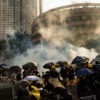Original: 【資本主義需要你失業】, published in Squatting 蹲點
Translators: ah boat, pingu, TC
If you would like to be involved in our translation work, please get in touch here.
Editor’s note: Under the effects of the anti-extradition movement and the coronavirus pandemic, Hong Kong’s unemployment rate has been consistently rising. Unemployment is itself the result of economic restructuring and sectoral shifts toward deindustrialization, and reserves for capital a pool of surplus labor force. But the government has forced individuals to bear its cost alone. The Comprehensive Social Security Assistance (CSSA) system, which stigmatizes the unemployed, pays but a small amount of money to “extend their lives.”1 Similarly, the coronavirus relief funds do not guarantee employment and merely obscure the need for long-term unemployment protections.
With the pandemic spreading across the world, the stagnation of production and consumption has also brought about a broader crisis.
In mid-April, the International Monetary Fund (IMF) stated that the global economy “almost certainly has entered a recession.” What followed was a wave of bankruptcy and unemployment.
An April 2020 report by the International Labor Organization points out that the coronavirus pandemic has affected 81% of workers worldwide, and will reduce working hours by 10.5% in the second quarter of 2020 (the equivalent of losing 305 million full-time jobs.)
With the anti-extradition bill protests and the outbreak of COVID-19, Hong Kong’s unemployment rate has risen from 2.8% in early 2019 to 4.2% in the first quarter of 2020. Considering that this statistic does not include people who have reduced work hours or have been forced to go on unpaid leaves, Hong Kong’s actual employment situation is even more grim.
Even though Hong Kong is currently not one of the areas most impacted by the global pandemic, nor is it one with the most stringent lockdown policies, its workers are easily one of the most vulnerable groups across capitalist societies. As an example, while the number of Americans receiving unemployment benefits may be setting new records by the day—close to 26.5 million have filed for unemployment—Hong Kong’s unemployed can only rely on the Comprehensive Social Security Assistance (CSSA.)
The capitalist conspiracy of unemployment
Unemployment has always been considered a personal problem in Hong Kong: if you’re fired it’s probably because you are lacking in certain skill sets; if you can’t find a job it’s definitely because you’re not qualified or lazy or have grandiose ambitions but little talent. A constant refrain: “Everyone has a job, why don’t you?” Since unemployment is a “personal problem”, the rationale is that it is up to the individual to figure out how to cope and survive: you should work as hard as possible, keep improving yourself and enhancing your value, accept the status quo in cases of limited ability, don’t bite off more than you can chew.
But should unemployment only stop being a personal problem in times of crisis?
Even during the golden years of the economic boom, Hong Kong was not in an “everyone has a job” situation (Hong Kong recorded its lowest unemployment rate of 1% in 1989.) Since the restructuring of Hong Kong’s economy in the ’90s, manufacturing’s share of total employment dropped from around 40% in the early ’80s to 2.3% in 2019, while the service industries saw continued employment growth in the same period. A longstanding “reserve army of labor” facilitates this type of economic restructuring, which critics have described as a “reservoir” that can be called up at any time to support whatever industry would need. So, while “unemployment” may be a disaster for the individual, it is a necessary component in sustaining the orderly flow of the capitalist economy. In other words, no matter how hard or well you work, “unemployment” is unavoidable.
Economic development under capitalism has not led to the shrinkage of the labor ‘reservoir’, but has in fact seen it endlessly deepen. The fate of an increasing number of workers is to join a surplus labor force that can be used and discarded at the capitalists’ whim.
Amid automation and computerization, economic development under capitalism has not led to the shrinkage of the labor “reservoir”, but has in fact seen it endlessly deepen. One aspect of this is how the deskilling of labor has made it much easier for workers to be replaced. Meanwhile, the technology of the gig economy has made it much easier for workers to be hired for unstable, precarious work. Other than a small group of technological elites, the fate of an increasing number of workers is to join a surplus labor force that can be used and discarded at the capitalists’ whim.
Epidemic crisis, social crisis, economic crisis—these do not give rise to labor’s predicament so much as reveal the root causes already latent in the current system, allowing us to see more clearly the exploitation of workers.
The stigma of the unemployed
Unemployment is not a personal issue but a structural one, so any approach to it needs to be systemic. Yet the Hong Kong government and the business sector have all along strongly opposed the creation of a permanent unemployment insurance system, instead upholding a residual model of welfare that focuses on (emergency) relief instead of permanent benefits. Such a relief-based social security system assumes that the government should only step in with a minimal safety net when both the market mechanism and family support structures happen to fail. In their view, “generous” benefits only serve to weaken the resolve of grassroots citizens, wasting public resources and putting additional strain on the government.
That “unemployment” is considered to be a “reservoir” of labor is a byproduct of the government’s skewed conception of welfare, one that further stigmatizes unemployed workers. With their severe means-testing and employment (re)-training plans, the majority of relief policies has long been tainted with intense social stigma, so that they are considered by some social scientists to have produced a “forsaken” class. Though a minority of people, this class is made an example of to browbeat the rest of society into tolerating decrepit working conditions and a high degree of exploitation, which is thought to be better than “the misery of not being exploited at all.”
In Hong Kong, the CSSA system plays this role. In 2009, Oxfam launched a CSSA Perception Survey and found that more than half (54.9%) of the respondents considered that the majority of CSSA applicants were unemployed, and that around seventy percent (69.3%) considered that “CSSA decreases the motivation of welfare recipients to work and indulges tendencies of idleness.” In reality, only about 5% of the total number of CSSA applicants were unemployed, and the level of assistance—a standard rate of HK$2,525 per month for an able-bodied adult—was far from sufficient to sustain basic living standards, in turn undermining applicants’ impetus to work.
The majority of relief policies has long been tainted with intense social stigma, so that they are considered to have produced a ‘forsaken’ class. This class is made an example of to browbeat the rest of society into tolerating decrepit working conditions and a high degree of exploitation.
Amid the pandemic, unemployment surged. The two rounds of Anti-epidemic Fund (「防疫抗疫」計劃) rolled out by the government were both on the basis of “supporting enterprises and safeguarding jobs (「撐企業、保就業」).” Despite much urging from the people, the government kept refusing to implement unemployment aid and left it up to the CSSA to support the jobless. While government officials wax poetic about the ability, integrity and resilience of the unemployed (「有手有腳、有骨氣,更是能屈能伸」), temporarily relaxing the net asset limit for social security does not change the fact that the CSSA is still, at its core, an emergency relief policy. The meager amount provided by the CSSA and the accompanying “Support for Self-reliance (SFS) Scheme (自力更生支援計劃)” still implicitly stigmatize the unemployed. How hypocritical is it that the government, instead of seriously reflecting on the shortcomings of the CSSA, is unabashedly calling for its destigmatization?
It all comes down to the government’s reluctance to see unemployment as a systemic problem rather than a personal one. Evident here is not only their unwillingness to step outside the role of “limited government”, but also their desire to maintain Hong Kong-style neoliberal governance. As long as unemployment stays a “reservoir” and a “cautionary tale” of dishonor, it will continue to weaken workers’ bargaining power against capitalists.
How to build a system of unemployment insurance?
The increase in unemployment surfaced a series of societal issues and led to large-scale crises. Admittedly, this made way for social reform, but it would be naive to sit around and wait for a bailout from the government or for them to introduce policies in favor of workers, especially when that government never dispensed with the colonial model after the official handover.
Following both SARS in 2003 and the financial crisis in 2008, labor unions have called for a permanent unemployment insurance system.
In the past twenty years, we’ve seen the leadership come and go, but the government’s response to unemployment has stayed surprisingly consistent: unemployment aid is still encumbered with a litany of bureaucratic procedures. The government must invest in a new system and a new staff: a new mechanism needs to be put into place befitting the pressing circumstances. A distant solution and continued procrastination will not suffice for as urgent and pervasive a problem as unemployment. And as the regime changes hands and repression intensifies, we don’t want to miss our window to mobilize before it’s too late.
A mere two decades has been enough time to build high-speed rails and cross-sea bridges— enough, literally, to move mountains and seas—yet there is still somehow no insurance policy for labor, nor did the elites even bother coming up with a new excuse.
The labor movement that had begun to thrive alongside political protests gives us a glimmer of hope: will the ongoing struggle gain new traction through labor? Will the new wave of unions mobilize a new public dedicated to pushing for unemployment insurance and other labor rights?
With two rounds of anti-epidemic measures totaling some HK$200 billion, it is not hard to see why the government prides itself on being among the “most progressive” administrations in the global crisis. But until we dismantle the governmentality of big market non-interventionism, public funds in the billions will always go towards “supporting” enterprises. Such a government has neither the intention nor ability to tend to its people’s livelihood.
In hindsight, it is clear that the Hong Kong government has never taken a proactive stance toward the welfare of its citizens. The 1967 riots has been thought of as a turning point, when strikers and protestors succeeded in calling attention to the social inequities and deep-seated class contradictions in the erstwhile colony, thereby imploring the Hong Kong government to start taking action about social welfare. The resistance movement thus forced the colonial government to develop a series of social welfare policies in the ’70s, which included reforming labor laws, improving basic safeguards for workers, instituting nine years of free education, even setting up the ICAC (Independent Commission Against Corruption), and so on.
However, some experts have since pointed out that, as Hong Kong entered the ’60s, the British government of the time had already been in the process of rolling out a limited array of welfare policies with a vested colonial interest. The 1967 riots, as they see it, merely helped the government justify further expansion and maneuver of such policies in the face of pushback from local industry and commerce. The ostensible increase in state spending and welfare improvements in the ’70s were in fact largely made under pressure from the British Labor Party; Hong Kong’s inexpensive labor of the time gave its manufacturing industry a significant advantage in the international market at a time when its British counterpart was dipping into the path of decline. No matter where its true motivations lied, the process through which the Hong Kong government has pushed out such half-hearted policies have been considered to be reactive, if not wholly passive, within the purview of colony.
Fast forward to the present, if the hope for a “progressive” government is all but dashed, then where do we find the will for change? In Hong Kong, most grassroots workers are not unionized. While there have been labor unions and welfare groups lobbying for better social security, they tend to be either apolitical or seriously hampered by neoliberal tendencies. The mobilizing power of these groups are limited, making it hard to exert political pressure.
Since the end of 2019, new labor unions have mushroomed in support of the anti-extradition law movement. By January 3, 2020, as many as 1,578 new unions registered their founding. The labor movement that had begun to thrive alongside political protests gives us a glimmer of hope: will the ongoing struggle that began in June 2019 gain new traction through labor? Will the new wave of unions mobilize a new public dedicated to pushing for unemployment insurance and other labor rights?
Footnotes
[1]The Comprehensive Social Security System (CSSA) is a welfare scheme in Hong Kong that provides eligible residents with supplementary payments toward meeting basic needs. All applicants need to go through an asset and income test. “Able-bodied” adults with “normal” health conditions are subject to additional criteria, such as participation in a job-seeking program and the status of dependents. The residency duration criterion has fluctuated and been contested in recent years: currently it stipulates that CSSA applicants must have been Hong Kong residents for more than one year. The eligible age of the elderly has also been raised from 60 to 65 years old in 2017.
Since the inception of the Social Welfare Department in the late ’50s, the government has abided by a non-interventionist logic regarding public expenditure; an increase in welfare spending would only be possible when there is a budget surplus, but the imperative to maintain a fiscal balance has also driven austere measures. Meanwhile, the government has attempted to ameliorate the impact of service cuts and benefit reductions with the insistence on traditional structures of family support. This equivocal approach to welfare provisions since colonial rule has persisted in the present: CSSA expenditure has steadily declined since 2005’s record 9% out of total government expenditure. ↩






